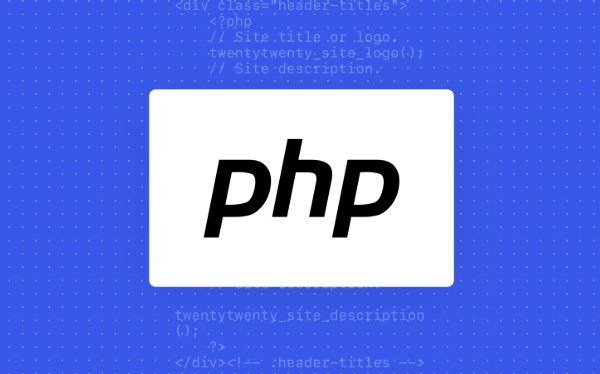 Backend Development
Backend Development
 PHP Tutorial
PHP Tutorial
 Analyzing the Performance Overhead of the $GLOBALS Superglobal
Analyzing the Performance Overhead of the $GLOBALS Superglobal
Analyzing the Performance Overhead of the $GLOBALS Superglobal
Aug 03, 2025 am 09:16 AMThe performance overhead of $GLOBALS is minimal in most cases but can become significant in high-frequency functions or long-running scripts; 1. $GLOBALS creates symbol table and memory overhead by mirroring all global variables; 2. Array access via $GLOBALS['var'] is slower than direct variable access; 3. Reference management increases complexity and hinders optimization; 4. Its use limits JIT and opcache effectiveness; 5. Best practices include avoiding $GLOBALS for configuration, using dependency injection, passing data explicitly, limiting global variables, and profiling before optimizing; ultimately, the greater cost of $GLOBALS is not performance but the technical debt it introduces through poor code design.

Using the $GLOBALS superglobal in PHP can introduce performance overhead, though in most real-world applications the impact is minimal. However, understanding when and how this overhead occurs helps developers make informed decisions—especially in performance-critical contexts.

What Is $GLOBALS and How Does It Work?
$GLOBALS is a PHP superglobal array that contains references to all variables currently defined in the global scope. For example:
$a = 10; echo $GLOBALS['a']; // Outputs: 10
Each entry in $GLOBALS is a reference to the actual variable, not a copy. This means modifying $GLOBALS['a'] also changes the original $a.

Because it provides access to all global variables, PHP must maintain this array throughout script execution, updating it whenever a new global variable is declared or removed.
Performance Implications of Using $GLOBALS
While convenient, $GLOBALS comes with several performance-related trade-offs:

Symbol Table Overhead: PHP maintains a symbol table for all variables.
$GLOBALSessentially mirrors this table as an associative array. Every global variable adds an entry to both the symbol table and the$GLOBALSarray, increasing memory usage.Array Access vs Direct Access: Accessing a variable via
$GLOBALS['var']involves an array lookup, which is slower than direct variable access ($var). Although the difference is small (nanoseconds), it can add up in loops or high-frequency functions.Reference Management: Since
$GLOBALSholds references, PHP must manage reference counts and avoid premature garbage collection. This introduces minor overhead compared to local variables, which are typically cleaned up automatically at scope exit.Optimization Limitations: The Zend Engine (PHP’s core) can optimize local variable access more aggressively. Variables accessed through
$GLOBALSare harder to optimize because their values may change unpredictably from anywhere in the code.
When the Overhead Matters
In typical web applications, the performance hit from $GLOBALS is negligible. However, it becomes relevant in:
High-frequency utility functions: If a function is called thousands of times and uses
$GLOBALS['config']instead of a passed parameter, the cumulative cost of array lookups adds up.Long-running scripts or daemons: In CLI scripts or persistent applications, memory bloat from unnecessary global references can degrade performance over time.
Code that disables function/method caching: Heavy reliance on globals can prevent opcache or JIT from optimizing code paths effectively.
Best Practices to Minimize Impact
To reduce potential overhead:
Avoid using
$GLOBALSfor configuration or dependency access. Use dependency injection instead.Pass required data explicitly to functions rather than relying on global state.
Limit the number of global variables. Fewer globals mean a smaller
$GLOBALSarray and less memory pressure.Use
global $var;cautiously. Whileglobalcreates a local reference to a global variable, it still relies on the same underlying mechanism as$GLOBALS.Profile your application. Use tools like Xdebug or Blackfire to identify bottlenecks. Don’t optimize
$GLOBALSuse prematurely without evidence.
Conclusion
The performance overhead of $GLOBALS is generally small and rarely a bottleneck in typical PHP applications. However, its use encourages poor coding practices—like tight coupling and hidden dependencies—that hurt maintainability and scalability more than raw speed.
From a performance standpoint, avoid $GLOBALS in hot code paths and favor explicit parameter passing. From a design standpoint, minimizing global state leads to cleaner, more testable, and more predictable code.
Basically, the real cost of $GLOBALS isn’t just CPU cycles—it’s technical debt.
The above is the detailed content of Analyzing the Performance Overhead of the $GLOBALS Superglobal. For more information, please follow other related articles on the PHP Chinese website!

Hot AI Tools

Undress AI Tool
Undress images for free

Undresser.AI Undress
AI-powered app for creating realistic nude photos

AI Clothes Remover
Online AI tool for removing clothes from photos.

Clothoff.io
AI clothes remover

Video Face Swap
Swap faces in any video effortlessly with our completely free AI face swap tool!

Hot Article

Hot Tools

Notepad++7.3.1
Easy-to-use and free code editor

SublimeText3 Chinese version
Chinese version, very easy to use

Zend Studio 13.0.1
Powerful PHP integrated development environment

Dreamweaver CS6
Visual web development tools

SublimeText3 Mac version
God-level code editing software (SublimeText3)
 Dependency Injection: The Superior Alternative to $GLOBALS
Aug 03, 2025 pm 03:56 PM
Dependency Injection: The Superior Alternative to $GLOBALS
Aug 03, 2025 pm 03:56 PM
Dependencyinjection(DI)issuperiortousing$GLOBALSbecauseitmakesdependenciesexplicit,whereas$GLOBALShidesthem.2.DIimprovestestabilitybyallowingeasymockingofdependencies,unlike$GLOBALSwhichrequiresmanipulatingglobalstate.3.DIreducestightcouplingbydecoup
 The Security Risks of Unchecked Global State via $GLOBALS
Aug 03, 2025 pm 04:20 PM
The Security Risks of Unchecked Global State via $GLOBALS
Aug 03, 2025 pm 04:20 PM
Uncheckeduseof$GLOBALSallowsunintendedvariableoverwriting,enablingattackerstomanipulatecriticaldatalikeuserIDsorroleswithoutvalidation;2.Itincreasestheattacksurfacebybreakingencapsulation,makingfunctionsdependentonmutableglobalstatethatcanbeexploited
 The Perils of Global State: Why You Should Avoid PHP's $GLOBALS
Aug 03, 2025 am 04:14 AM
The Perils of Global State: Why You Should Avoid PHP's $GLOBALS
Aug 03, 2025 am 04:14 AM
Using$GLOBALScreateshiddendependencies,makingfunctionshardertotest,fragile,andunreusable;2.Itcomplicatesunittestingbyrequiringglobalstatemanipulation,leadingtoslow,fragiletests;3.Globalstateisunpredictableduetouncontrolledmodifications,causingbugsand
 Refactoring Legacy PHP: A Practical Guide to Eliminating $GLOBALS
Aug 03, 2025 am 11:14 AM
Refactoring Legacy PHP: A Practical Guide to Eliminating $GLOBALS
Aug 03, 2025 am 11:14 AM
To eliminate $GLOBALS in PHP, it should first analyze its usage and then replace global variables with dependency injection, configuring objects, and step-by-step refactoring. 1. Use grep and other tools to find out all the usage of $GLOBALS and record the key names and locations; 2. Replace global variables such as database connections and configurations with explicit dependencies, such as injecting PDO or Config objects through constructors; 3. Create service classes (such as Logger, UserService) to encapsulate functions to avoid function dependence on global state; 4. Centrally manage the configuration, load from the configuration file returning the array, and inject the required classes; 5. Reconstruct the database in a small way, replacing a $GLOBALS reference at a time, and test to ensure consistent behavior; 6. Beware of including
 Debugging Global State Chaos Caused by $GLOBALS Manipulation
Aug 03, 2025 pm 01:46 PM
Debugging Global State Chaos Caused by $GLOBALS Manipulation
Aug 03, 2025 pm 01:46 PM
$GLOBALSmanipulationcancauseunpredictablebugsinPHP;todebugandresolveit,1.Understandthat$GLOBALSprovidesglobalaccesstoallvariables,makingstatechangeshardtotrack;2.DetectunwantedmodificationsusingstrategicdebugloggingandaGlobalsWatcherclasstosnapshotan
 Navigating the Minefield: Legitimate (and Rare) Use Cases for $GLOBALS
Aug 04, 2025 pm 02:10 PM
Navigating the Minefield: Legitimate (and Rare) Use Cases for $GLOBALS
Aug 04, 2025 pm 02:10 PM
Using$GLOBALSmaybeacceptableinlegacysystemslikeWordPresspluginswhereitensurescompatibility,2.Itcanbeusedtemporarilyduringbootstrappingbeforedependencyinjectionisavailable,3.Itissuitableforread-onlydebuggingtoolsindevelopmentenvironments.Despitethesec
 $GLOBALS: A Historical Relic or a Misunderstood Tool?
Aug 03, 2025 pm 02:31 PM
$GLOBALS: A Historical Relic or a Misunderstood Tool?
Aug 03, 2025 pm 02:31 PM
$GLOBALSisnotinherentlybad;itisatoolwhosevaluedependsonitsuse.Itisanassociativearrayprovidingaccesstoallglobalvariables,allowingfunctionstoreadglobalvariableswithouttheglobalkeyword.Itsnegativereputationstemsfromencouragingglobalstate,obscuringdepend
 $GLOBALS vs. the `global` Keyword: Understanding the Core Differences
Aug 04, 2025 pm 03:59 PM
$GLOBALS vs. the `global` Keyword: Understanding the Core Differences
Aug 04, 2025 pm 03:59 PM
$GLOBALS and global are both used to access global variables in functions, but there are key differences: 1.$GLOBALS is a hyperglobal array that accesses variables through key names, such as $GLOBALS['var'], while global is a language structure, and global $var needs to be declared; 2.$GLOBALS does not require pre-declaration and can be used directly, global must be declared first and then used; 3.$GLOBALS supports dynamic access, such as $GLOBALS[$varName], global does not support dynamic declaration; 4.unset($GLOBALS['var']) will delete the global variable itself, while unset($var) is in global$v





